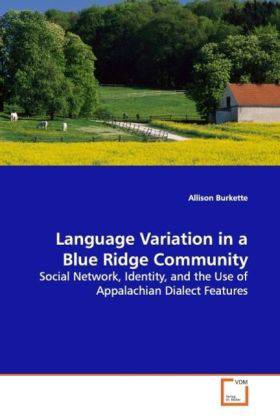
- Afhalen na 1 uur in een winkel met voorraad
- Gratis thuislevering in België vanaf € 30
- Ruim aanbod met 7 miljoen producten
- Afhalen na 1 uur in een winkel met voorraad
- Gratis thuislevering in België vanaf € 30
- Ruim aanbod met 7 miljoen producten
Zoeken
Language Variation in a Blue Ridge Community
Social Network, Identity, and the Use of Appalachian Dialect Features
Allison Burkette
Paperback | Engels
€ 67,45
+ 134 punten
Omschrijving
"Language Variation in a Small Blue Ridge Community"
examines the application of Social Network Theory
(SNT) to a
sociolinguistic study conducted in a small, rural
community located
in the Appalachian dialect region. This study
focuses on data from
thirteen individuals, all members of the same
close-knit social
network. The informants are residents of a small town
('Carrollton'),
located in the mountains of western North Carolina,
an area
experiencing social and economic change as the result
of tourism
and the construction of a golf resort. Grammatical
and phonological
data are presented and analyzed in terms of the
traditional
sociolinguistic variables of age and education level
as well as in
terms of the social network members' network scores.
Though SNT
carries with it expectations regarding the uniformity
of network
members' speech and the maintenance of marked linguistic
features, the variable of network score could not be
linked
statistically to the use of many Carrollton
linguistic features. Given
this unexpected result, this work provides an
explanation of the
intra-network variation through the use of an
'identity' variable.
examines the application of Social Network Theory
(SNT) to a
sociolinguistic study conducted in a small, rural
community located
in the Appalachian dialect region. This study
focuses on data from
thirteen individuals, all members of the same
close-knit social
network. The informants are residents of a small town
('Carrollton'),
located in the mountains of western North Carolina,
an area
experiencing social and economic change as the result
of tourism
and the construction of a golf resort. Grammatical
and phonological
data are presented and analyzed in terms of the
traditional
sociolinguistic variables of age and education level
as well as in
terms of the social network members' network scores.
Though SNT
carries with it expectations regarding the uniformity
of network
members' speech and the maintenance of marked linguistic
features, the variable of network score could not be
linked
statistically to the use of many Carrollton
linguistic features. Given
this unexpected result, this work provides an
explanation of the
intra-network variation through the use of an
'identity' variable.
Specificaties
Betrokkenen
- Auteur(s):
- Uitgeverij:
Inhoud
- Aantal bladzijden:
- 196
- Taal:
- Engels
Eigenschappen
- Productcode (EAN):
- 9783639133929
- Uitvoering:
- Paperback

Alleen bij Standaard Boekhandel
+ 134 punten op je klantenkaart van Standaard Boekhandel
Beoordelingen
We publiceren alleen reviews die voldoen aan de voorwaarden voor reviews. Bekijk onze voorwaarden voor reviews.








